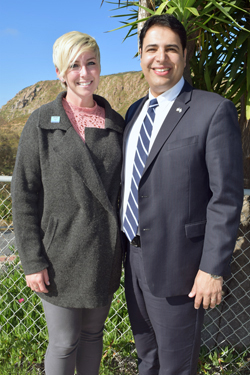By Donald H. Harrison


SAN DIEGO – Israel’s former consul for media affairs in New York City, Shahar Azani, is now the director for the northeastern United States for StandWithUs, meaning his responsibility is to bring a proactive, pro-Israel message to the colleges and high schools of New York, New Jersey, and the New England states.
During a brief visit to the West Coast in connection with an anti-BDS strategy session held in Los Angeles, Azani made time to visit with San Diego Jewish World in the company of Sara Miller, who is the southwestern director for StandWithUs.
He proclaimed that pro-Israel organizations need to recapture the Israel/ Palestine narrative from BDS representatives and other anti-Israel forces. In an interview, he outlined three steps he deems essential.
First, he said, be aware and challenge the “bottom up” strategy employed by Israel’s enemies, in which little by little they attempt to delegitimize Israel. One recent example was at the United Nations where a bureaucrat decided to block the display of all the panels of a exhibit on Israel. This wasn’t at the direction of the Security Council, or the Secretary General, it was one minor officeholder who felt that what the exhibit said about Zionism, Arab Israelis and Jerusalem was not to his liking. So the bureaucrat blocked display of those exhibit panels – until Israel complained. Another example, also at the U.N., was when a map was distributed to a committee studying migratory bird patterns. The map showing the flight path erased the name of Israel – the work of an Iranian mapmaker. These actions, small by themselves, need to be challenged because they are part of a larger pattern, Azani said.
Second, he said, pro-Israel forces need to be aware of the facts and be prepared to correct misstatements. When Bernie Sanders’ interview appeared in the New York Daily News in which the presidential candidate estimated that Operation Protective Edge had resulted in over 10,000 civilian deaths in Gaza – a figure that was many times higher than even what Hamas had claimed – Azani happened to be meeting with students at a Zionistic school in New York>
He said he asked the students how they would respond to Sanders’ statement. One suggested that people should emphasize the complexity of the situation in the Middle East. Another suggested that Israel has a right to self-defense. Another said the situation that families faced in southern Israel with the rockets fired from Gaza was unbearable. None of them, although Zionists to the core, challenged Sanders’ numbers.
The United Nations Office for the Coordination of Humanitarian Affairs has reported that 2,104 Palestinians were killed in the 2014 war; Israeli authorities estimate that some 1,000 of those killed in its defensive operations were terrorists, while the UN figure is 642.
The point, said Azani, is “we cannot assume that someone who is a Zionist knows” the true facts. Education is necessary, not only for the general public but also for Israel’s true friends.
Azani noted the adage that if a lie is repeated often enough people will believe it. “It is like the ‘settlements,’” he said. “They keep on using the term “illegal settlements.” It is a contested issue, a political issue, a diplomatic quagmire – all these are givens. But when you say the word ‘illegal’ settlements, the fact is the settlements are not illegal. To determine the legality of the settlements, you have to go back to the British Mandate over Palestine in 1922. If you look at it only through a legal prism, the settlements are not illegal. They are contested, yes. But when you use the word ‘illegal,’ you make them ‘illegal’ by usage.”
Third, said Azani, not every conversation about Israel needs to deal with the dispute with the Palestinians. “Yes, it (the dispute) exists, but there is so much else out there,” he said. “I want to focus on Israel and the rest of the world for once. Not everything we do, or everything we are, is a counter reaction to the existence of the Palestinian narrative. There is a vibrant Israel that is strong on its own.”
Particularly in the fields of water, economic development and conservation, Israel has a worldwide reputation, Azani said. Israelis are inventive, creative and artistic, he said.
Recently, for example, he showed off at Brown University a robot that could be operated remotely with an iPad. They dressed the robot in a coat and tie, and from his office in New York, Azani talked via the monitor atop the robot’s “shoulders” about how this Israeli invention by Roey Tzezana could enable scholars to participate in conferences that they could not attend.
On another recent occasion, he arranged a touring exhibition for artist Amit Shimoni, who imagines what historical figures might look like with more modern looking haircuts.
The idea, said Azani, is that conversations about Israel need not always be gloomy or geopolitical. There can be spring, not only winter.
*
Harrison is editor of San Diego Jewish World. He may be contacted via donald.harrison@sdjewishworld.com . Comments intended for publication in the space below must be accompanied by the letter writer’s first and last name and by his/ her city and state of residence (city and country for those outside the U.S.)